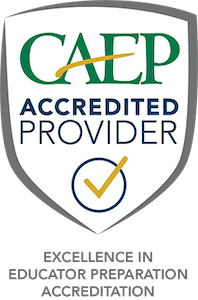College of Education and Professional Development

Teaching Standards
Description: The Council for Accreditation of Educator Preparation, through an appointed Steering Committee for the Elementary Teacher Preparation Standards 2015-2018, is pleased to offer this set of educator preparation standards that outline what completers graduating from a K-6 Elementary educator preparation program should know and be able to do by the end of their preparation program and to ensure that each student learns and develops to his/her fullest potential.
Description: College and Career Readiness standards ensure that students exit high school prepared for success in a wide range of high-quality postsecondary options. Specifically, college and career readiness refers to the knowledge, skills, and dispositions needed to be successful in postsecondary opportunities that lead to employment. West Virginia’s approach to college and career readiness builds on foundations established through a comprehensive approach to high-quality early learning programming that extends through the middle and secondary learning years. College and career ready students in West Virginia exit high school with a complete understanding of the career opportunities available to them, the education necessary to be successful in their chosen pathway, and a plan to attain their goals.
- Standards
- College and Career Readiness Webpage (West Virginia Department of Education)
Description: The Council of Chief State School Officers (CCSSO), through its Interstate Teacher Assessment and Support Consortium (InTASC), is pleased to offer this set of model core teaching standards that outline what teachers should know and be able to do to ensure every K-12 student reaches the goal of being ready to enter college or the workforce in today’s world. These standards outline the common principles and foundations of teaching practice that cut across all subject areas and grade levels and that are necessary to improve student achievement. More importantly, these Model Core Teaching Standards articulate what effective teaching and learning looks like in a transformed public education system – one that empowers every learner to take ownership of their learning, that emphasizes the learning of content and application of knowledge and skill to real world problems, that values the differences each learner brings to the learning experience, and that leverages rapidly changing learning environments by recognizing the possibilities they bring to maximize learning and engage learners. A transformed public education system requires a new vision of teaching.
Description: National Board Certification is the most respected professional certification available in education and provides numerous benefits to teachers, students and schools. It was designed to develop, retain and recognize accomplished teachers and to generate ongoing improvement in schools nationwide.
Description: Students require knowledge and skills that are unique to the times. The Global 21 initiative and the professional teaching standards ensure that every West Virginia student has the opportunity to succeed in a socially diverse, technologically complex world and its globally competitive economy. The professional teaching standards articulate, in five broad areas, what every West Virginia teacher will know and be able to do in supporting students with effective and relevant instruction that will prepare them to meet the challenges of today’s classrooms.
Description: The West Virginia Teacher Performance Assessment (WVTPA) is a collaboratively developed assessment that is completed by all candidates during the culminating internship/student teaching experience. The WVTPA requires that teacher candidates draw on pedagogical and content pedagogical knowledge to plan and deliver instruction that builds on each student’s strengths, needs, and prior experiences. Through this performance assessment, teacher candidates provide credible evidence of student impact.
Technology Standards
Standards
Specialized Accreditation Standards
Program:
- School Library Media Specialist (Advanced-Level)
Resources:
Programs:
- Special Education Multicategorical (K-6, 5-Adult)
- Preschool Special Needs
- Deaf and Hard of Hearing
- Visually Impaired
Resources:
Programs:
- Reading Specialist
- This certification undergoes CAEP Evidence Review of Standard One (formerly known as CAEP Program Review with Feedback). EPPs will build a case for CAEP Standard 1 and submit complete evidence for the standard as part of the self-study report. The evidence will address candidate proficiencies relevant to the learner and learning, specialty content and content pedagogy, instructional practice, and professional responsibilities. Data will be disaggregated data by licensure areas, degree levels, and modes of delivery. EPPs describe how they use the evidence for continuous improvement.
Resources:
Programs:
- Early Childhood Education
- Preschool Special Needs
Resources:
Programs:
- English Language Arts
Resources:
Programs:
- Elementary Math Specialist (Advanced)
- Mathematics 5-12 (Initial)
- Mathematics 5-9 (Initial)
- Math through Algebra I (Advanced)
Resources:
- NCTM Standards (Middle Level, 2020)
- NCTM Standards (Secondary, 2020)
- CAEP/NCTM Webpage
Programs:
- School Psychology
Resources:
Programs:
- School Principalship
Resources:
Programs:
- Health 5-Adult
- Physical Education PreK-Adult
Resources:
- Health Education Teacher Education (HETE) Standards (2018)
- HETE Webpage
- Physical Education Teacher Education (PETE) Standards (2017)
- PETE Webpage
Programs:
- Teaching English as a Second Language (Licensure)
Resources:

